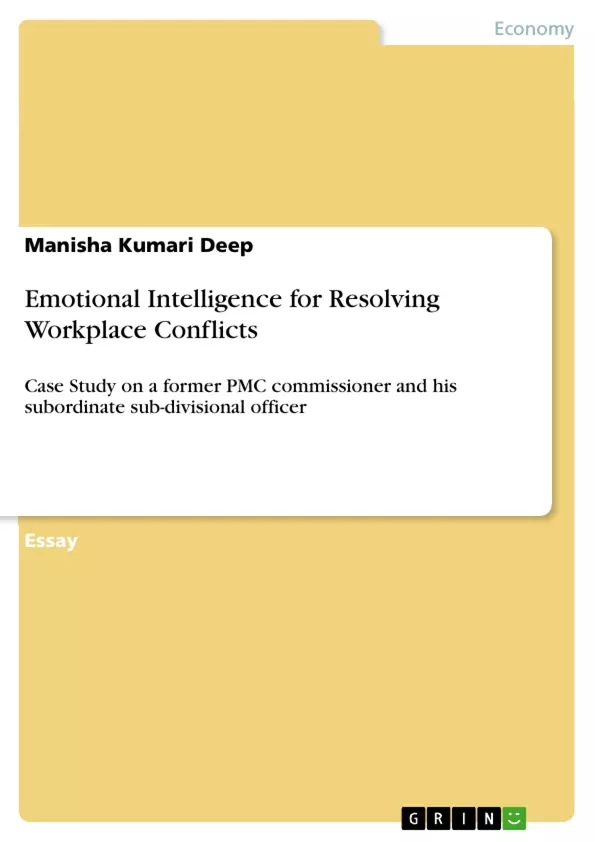The concept of Emotional Intelligence (EI) dates back to 1964. But it gained recognition in 1991. Many researches were done on EI to see if it is really important. Hence I have also tried to conclude if EI is important at workplace and why is it important. A real-life case of supervisor and slave has been has been discussed here in context of EI. A brief description of EI, workplace conflict and importance of EI at workplace has been stated. Further PMC’s real-life case scenario has been discussed and the learning stated which could have resolved the situation without exaggerating it.
Other Reads by the Author
The Trial of Hope (Amazon)
An Alien Land (Kobo)
2 Moms (Kobo)
Unfolding Disaster (Kobo)
Walk to School (Kobo)
51 Points in Raising Awesome Kids (Kobo)
Organic IT Infrastructure Planning and Implementation (Amazon)
Grin Books
Positive Employee Recruitment and Retention Vital for Organizations
Digital India Mission. Implications on Social Inclusion and Digital Citizenship
Cloud Computing. DDoS, Blockchain, Regulation and Compliance
Organic eLearning (OE-Learning)
The Way of Prime Minister Narendra Modi's Leadership
Feasibility Study between Continuous Adaptive Risk and Trust Assessment and Organic Networks
I am my supervisor’s slave: Supervisor subordinate relationship is vital for organizational efficiency
Brands and their Shockvertisement Strategies
The Future of Blockchain in Banking
Social Media Marketing: Author’s Quandary Decoded (Amazon)
Inhaltsverzeichnis (Table of Contents)
- Emotional Intelligence
- Definition and Description of Emotional Intelligence
- Emotional Intelligence Coordinates
- Importance of Emotional Intelligence
- Workplace Conflict
- Importance of EI at Workplace
Zielsetzung und Themenschwerpunkte (Objectives and Key Themes)
This document explores the relevance of emotional intelligence (EI) in managing and resolving workplace conflicts. It analyzes the concept of EI, its importance in personal and professional relationships, and its practical application in a real-life case study.
- Understanding the definition and elements of emotional intelligence.
- Analyzing the importance of EI in personal and professional relationships.
- Examining how EI contributes to better social relations, academic achievement, and psychological well-being.
- Exploring the role of EI in managing and resolving workplace conflicts.
- Highlighting the benefits of incorporating EI into managerial skills.
Zusammenfassung der Kapitel (Chapter Summaries)
- Emotional Intelligence: This section defines and describes emotional intelligence, highlighting its five main elements: self-awareness, self-regulation, motivation, empathy, and social skills. It also explains the importance of EI in various aspects of life, including social relations, academic achievement, and psychological well-being.
- Workplace Conflict: This chapter delves into the dynamics of workplace conflict, emphasizing the importance of respectful communication, emotional agility, and constructive feedback in mitigating such conflicts. It underscores the role of EI in addressing negative emotions and finding solutions to workplace disputes.
- Importance of EI at Workplace: This section explores the significance of EI in leadership and management. It argues that incorporating EI into managerial skills can enhance empathy, motivation, and communication within organizations, leading to improved performance and employee satisfaction.
Schlüsselwörter (Keywords)
This document focuses on the concepts of emotional intelligence, workplace conflict, and the importance of EI in leadership and management. Key terms include: self-awareness, self-regulation, motivation, empathy, social skills, emotional agility, constructive feedback, and emotional quotient.
Frequently Asked Questions
What is Emotional Intelligence (EI)?
Emotional Intelligence (EI) is the ability to recognize, understand, and manage our own emotions while also recognizing and influencing the emotions of others. It consists of five main elements: self-awareness, self-regulation, motivation, empathy, and social skills.
Why is Emotional Intelligence important in the workplace?
EI is vital for organizational efficiency because it improves personal and professional relationships, enhances social relations, and contributes to psychological well-being. It is especially important for leadership and management to improve empathy and communication.
How does EI help in resolving workplace conflicts?
EI helps address negative emotions and find constructive solutions to disputes. It emphasizes respectful communication, emotional agility, and providing constructive feedback to mitigate conflicts before they escalate.
What are the key themes of the document?
The document focuses on the definition of EI, its importance in professional settings, managing workplace conflicts, and the role of EI in effective management and leadership skills.
When did the concept of Emotional Intelligence gain widespread recognition?
While the concept dates back to 1964, it gained significant recognition and research focus starting in 1991.
- Quote paper
- Dr. Manisha Kumari Deep (Author), 2018, Emotional Intelligence for Resolving Workplace Conflicts, Munich, GRIN Verlag, https://www.grin.com/document/434878



